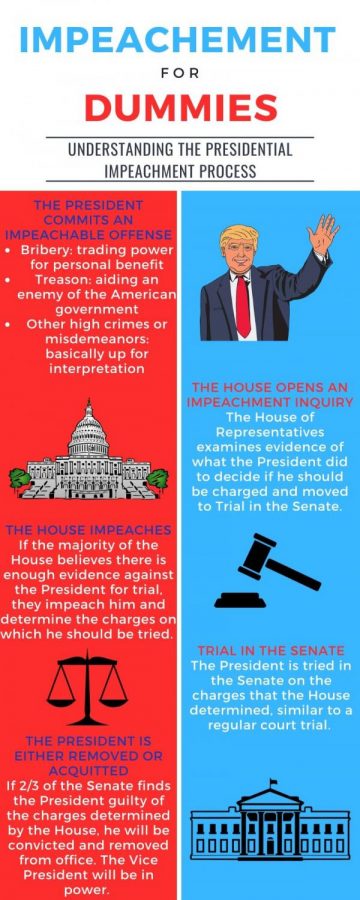Impeachment For Dummies
December 16, 2019
Is Trump going to get kicked out of office? What even is impeachment? Does any of this mean anything since he’s still tweeting and making decisions? In a recent survey of Charlottesville High School students, 100% of students are aware that Trump is being tried for impeachment, but only 66% actually understand the process and what the charges are against him. Whether or not you’re politically savvy and have been keeping up with the news, you still may be super confused. Here is a simplified guide to the current impeachment process.
How Does Impeachment and Removal Work?
People often believe that impeachment is simply the process of the president getting removed from office. That isn’t true. Impeachment is only the first step in possibly removing a person in the government from office, in which the House of Representatives determines whether or not to accuse the person of illegal actions. Then the process is moved to trial in the Senate, where the official will either be acquitted (found innocent), or convicted (found guilty and removed from office). This process is in place by the Constitution so that the Congress has the power to remove an official from office who is abusing their political power and to keep our government from becoming corrupt.
For a government official, primarily the president, to go through an impeachment inquiry, they must commit grounds for impeachment, which is when they do something that abuses their power. The three main grounds for impeachment are treason, which is when someone aids an enemy to the American government; bribery, which is when someone trades their power in their professional role for things of personal benefit; and other high crimes or misdemeanors, which are illegal actions against the state. “These crimes all describe ways a person could use the powers of their government job for their own personal gain, rather than doing what is right or best for the nation or our people,” said Mr. Gore, a C.H.S. government teacher.
Impeachment is done by the House of Representatives and is not just for the president. When a government official does something that may be considered grounds for impeachment, the House decides to open an impeachment inquiry. This means that representatives gather and examine evidence regarding what the official did, including witness testimonies in impeachment hearings. They decide at the end of the proceedings whether or not the official committed an impeachable offense and if there should be a trial in the Senate. Impeachment is simply a process of moving to trial in the Senate. This is similar to an indictment in regular court.
The trial that occurs in the Senate is slightly different than a regular court trial. Similar to regular court, there is a prosecutor and a defendant. However, the Senate sets their own court of law, which means they determine the process of the trial and what the duties of the senators are. Senators serve as jurors, which means they will vote to acquit or convict at the end of the proceedings. Unlike regular court, they are in some cases able to ask questions to the testifiers. One of the Senate’s primary jobs is to decide how to interpret the laws in the Constitution and whether or not what the official did breaks those laws. This is not standard in a regular court of law. The only rule that the Constitution states about the trial in the Senate is that there must be a two-thirds majority vote to convict, meaning 67 out of 100 senators must vote to convict the president of the crime to remove them from office.
Convicting someone in the trial in the Senate does not necessarily mean that the person goes to jail. Once the person is removed from office, they will then enter a regular court trial if the crime is serious enough. During this entire process, the president’s duties remain the same and he remains in power until he is convicted.
What Did Trump Do?
Whether or not you think President Trump should be in office, do you actually know what he may or may not have done to currently be on trial?
Basically, the U.S. government had $400 million dollars that they were going to give to their ally, Ukraine, so that Ukraine could purchase military resources to fight Russia, for their own defensive purposes. It is claimed that Trump asked Ukraine to release a statement to the public stating that they are opening investigations on both Joe Biden, and an interference in the 2016 election presumably on Hillary Clinton’s behalf. There is evidence that Trump’s lawyer, Rudy Giuliani, was in Ukraine, asking officials to do these investigations.
Here’s why Trump would do this. Joe Biden, the former vice-president, is running as a democrat in the 2020 election against Trump. Biden’s son, Hunter Biden, was on the board of a Ukranian company that was paying him almost 1 million dollars a year (money moves). However, this company appeared to be doing corrupt work and was supposed to be investigated by the Ukranian government. Trump claimed that Biden got the prosecutor fired who was supposed to be investigating the company because Biden’s son’s connection to the company. However, Biden actually got the prosecutor fired because he wasn’t investigating the company properly. Trump wanted Ukraine to state that they were investigating Biden so that it would appear Biden was corrupt and Trump’s chances for re-election would increase.
Trump also wanted Ukraine to say that they were investigating the previous Ukrianian government’s involvement in the 2016 election, which Trump won against Hillary Clinton. Trump wanted the Ukranian government to state that they were investigating the election so that it would counteract Russia’s discovered involvement in the 2016 election, and therefore also increase his chances for re-election.
You may have heard of the Muller Investigation, which happened from 2017 to 2019. This was the trial that discovered evidence that Russia was involved in the 2016 election to aid Trump. It is still unclear whether or not Trump was working with Russia during that time, and there were claims that he obstructed justice during the investigation. He almost went to impeachment trial for this, but there was not enough evidence against him. This is why he wanted to put the attention on Ukraine.
As for what the actual charges against Trump are, it appears that the House will decide to indict him on abuse of power and obstruction of Congress. Mr. Gore summarizes, “Trump used United States power and resources (military aid to an ally [Ukraine]) to get some kind of personal benefit (improving his chances of reelection), while harming the interests of the United States (leaving an ally vulnerable to aggression by our greatest rival, Russia, and compromising the fairness of our elections).”
What is Currently Happening in the Process?
In October, 17 witnesses testified in front of the House but it was not public. Then, in November, 12 people testified publicly in front of the House. The witnesses included investigators, people on Trump’s staff who were involved in working with Ukraine, and experts who explained how Trump’s offenses go against the Constitution. There is substantial evidence that a phone call took place between Trump and the Ukranian president in which Trump said he would grant Ukraine the money for military aid if only if they opened these investigations. There have also been testimonies proving that people working for Trump did in fact contact Ukrainian officials to open these investigations on Trump’s behalf.
Currently, the House just finished the impeachment inquiry, which means they are finished with listening to testimonies and examining evidence. Now the committees of the Representatives will draft articles of impeachment, and the House will vote whether or not to accuse Trump of the charges they have yet to decide on.
Trump is responding to everything going on as a “hoax” and a “witch hunt.” He’s also taken to trying to mock and intimidate the testifiers. Mature.
What Might Happen Next?
Sometime before Christmas, the House will release the results of their vote on whether or not Trump will move to trial in the Senate. There seems at this time to be enough evidence against him, as well as the fact that the House is primarily Democratic. Therefore, it seems likely he will be impeached and moved to trial.
If Trump is convicted in the trial and removed from office, he would most likely go to regular court for perjury, obstruction of justice, and bribery. Vice President Mike Pence would become president. However, this doesn’t seem likely because there is almost only a year left of the President’s term, and the Senate has a majority of Republican senators, so he will probably be acquitted.
You may be wondering what this actually does to Trump’s chances of reelection. As we know, almost 50% of the country voted for Trump in the 2016 election, even though he didn’t win the popular vote. William Antholis, a political scientist at the University of Virginia, said “45% of the public still support Trump and believe he shouldn’t be impeached. 5% may be persuaded to vote against him, but it’s not likely.” This demonstrates that supporters of Trump don’t seem entirely deterred by the current impeachment process and believe that accusations against him are false.
Many experts say that these are the most serious offenses committed by a president who has ever been impeached. Johnson and Clinton are the only other presidents who have been impeached, but neither were convicted by the Senate. An impeachment inquiry was opened against Nixon, but he resigned before he could be formally impeached.
This process is incredibly confusing, but in many ways it’s also pretty cool. “I like to point out to my students that events like this impeachment will be part of the history that people in the future will look back on and study, and we get to experience it first-hand,” Gore said.






